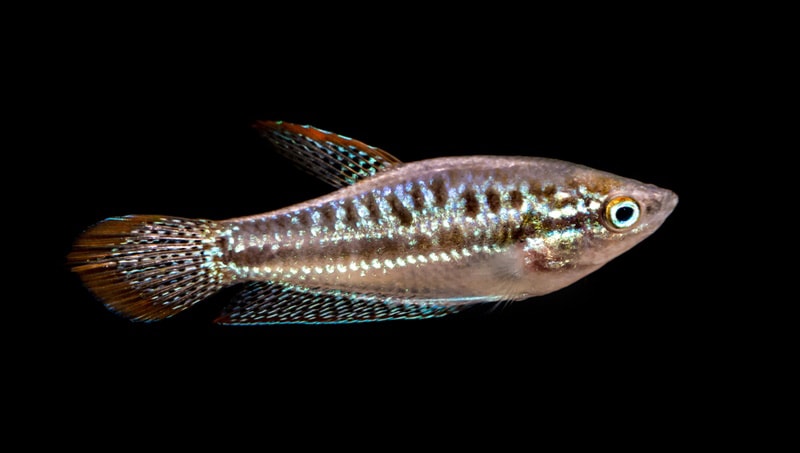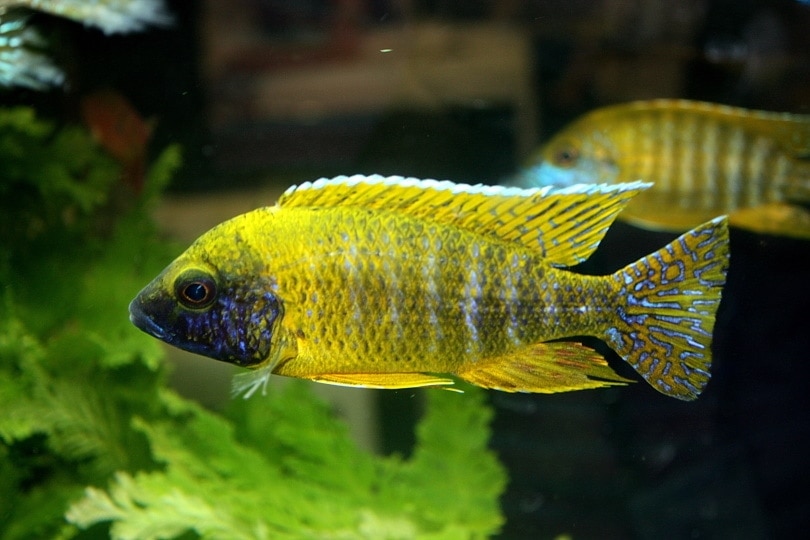Can Fish Smell? Vet-Approved Facts & FAQ
Updated on
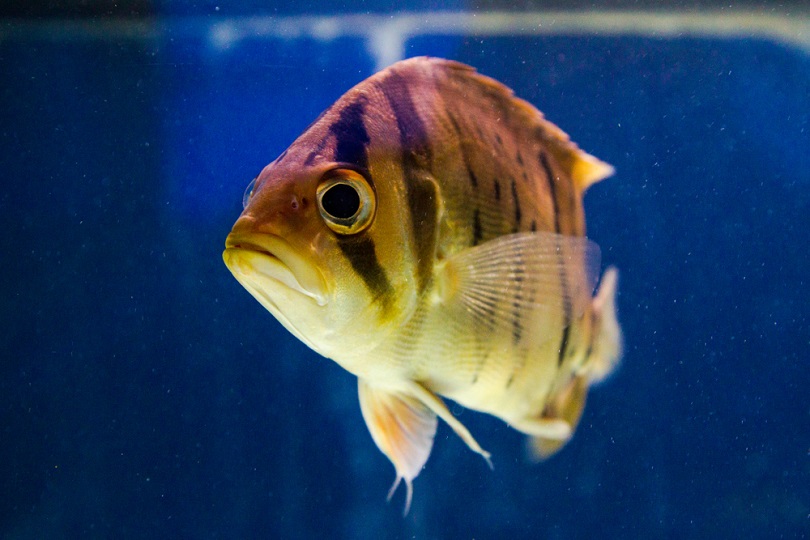
Click to Skip Ahead
Fish use their senses to navigate their environment, and they are capable of smelling underwater. It might seem strange that a fish would be able to smell since we associate smells with air. However, a fish’s olfactory system is quite complex and different from humans and other land animals, which allows them to pick up different scents in the water.
Ever wondered how your aquarium fish can locate food that they might not have seen you place inside the tank? This is all possible thanks to a fish’s olfactory system. This article will discuss the science behind a fish’s olfactory system, and how fish can smell in the water.
Can Fish Smell Underwater?
Yes, most fish can smell underwater, and they are quite good at it too. It is estimated that a fish’s sense of smell is around 1,000 times better than a human’s. A fish’s sense of smell is known as olfaction or chemoreception, and it is part of a fish’s chemosensory system that allows them to detect chemical stimuli. Fish seem to have a highly developed sense of smell, which has many functions in their everyday life, from finding mates to locating food items in the water.
Fish don’t necessarily smell airborne gases like we can, instead, they detect chemical-based odor molecules in the water. These molecules are processed by the fish’s brain to give them an idea of what’s going on in their surroundings. In a way, it is quite similar to how a human would smell and detect things in the air.

Do Fish Breath Through Their Noses?
While humans and other terrestrial animals rely on their noses to breathe and smell, fish only use their nares (nostrils) to smell. This is because fish do not breathe through their nares, but rather their gills. Fish can’t use their gills to smell, so they rely on their olfactory system to detect odor molecules in the water.
Please note, fish in the Anabantoidei suborder, such as the Betta, Paradise Fish, and Gourami have an additional lung-like breathing organ known as the labyrinth organ. This organ allows them to take in oxygen directly from the air instead of through the water via their gills. However, such fish aren’t born with this organ and it slowly develops as they age as an adaptation for living in waters that are stagnant and low in dissolved oxygen.
A fish’s gills have filaments that allow oxygen in the water to be absorbed into their bloodstream, so they have no real use for breathing out of their nares. A fish’s respiratory system that they use for breathing is not linked to a fish’s nares, since it is linked to their olfactory system. If these two systems were connected, then fish would be able to smell and breathe from their nares like we do.
A fish can either have one or two pairs of nares, such as the Goldfish which has two nares, or Perch which have four nares. The nares are usually located on the fish’s snout in the area between the eyes and mouth. A fish’s nares can be visible if you look closely at their face, and it appears as small openings on either side of the fish’s nasal bridge. Certain fish such as Goldfish have raised skin flaps above the nares that channel water over their olfactory organ which enables them to smell. However, the structure of the fish’s nares can look different depending on the species.
Understanding a Fish’s Olfactory System
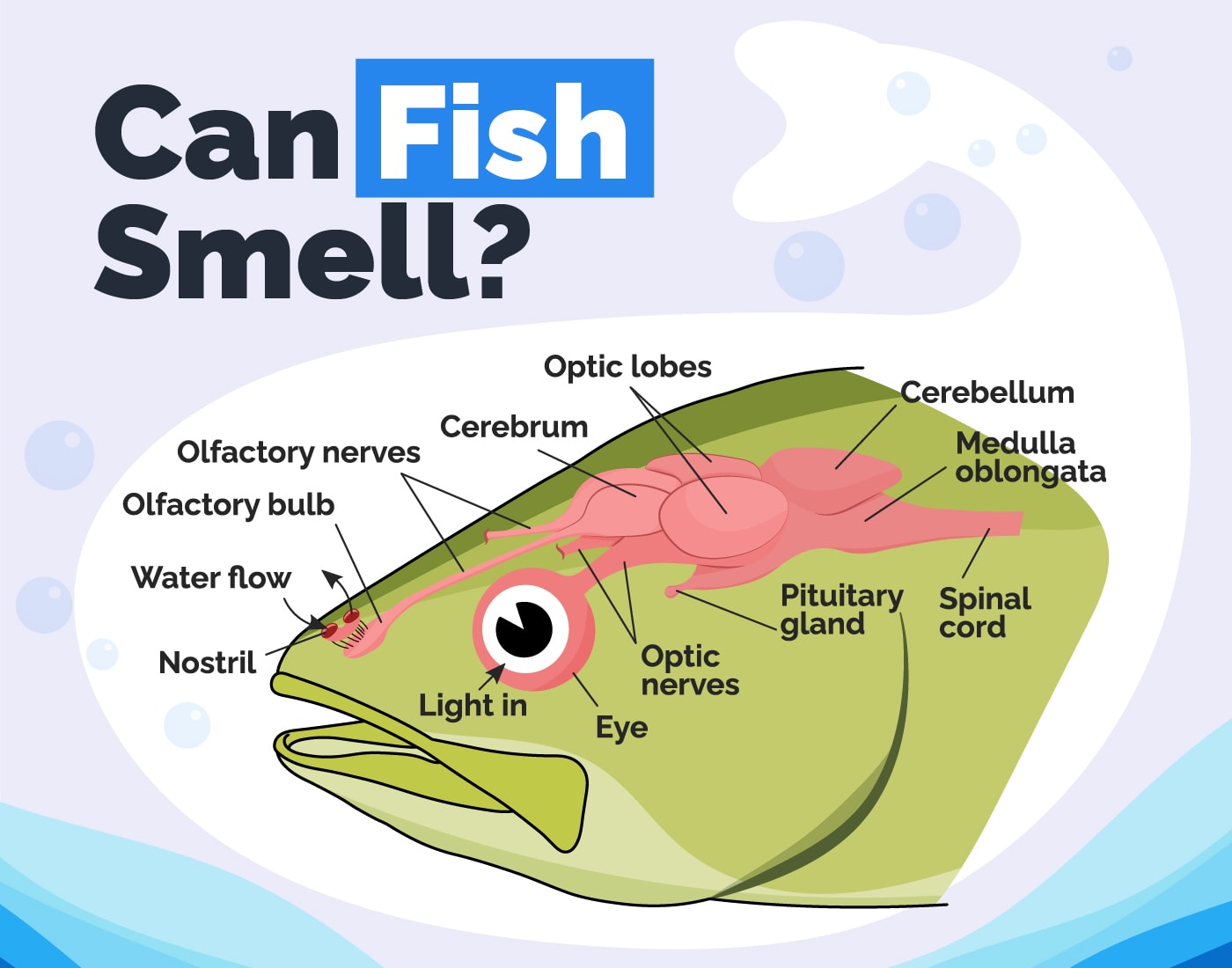
A fish’s olfactory system is quite fascinating and allows us to get a better understanding of how they can smell things underwater.
The Structure
So, what does a fish’s olfactory system consist of? For most fish, the olfactory system consists of the fish’s anterior and posterior nares, nasal cavities, and olfactory organs. The nares are the external part of a fish’s olfactory system, and it lead to internal structures like the receptor cells lined on the fish’s epithelium and the olfactory bulb by their forebrain.
A fish’s olfactory epithelium is covered with lamellae and various sensory cells containing odor receptors. Due to the lamellae’s rose-like structure, the epithelium with its lamellae is typically referred to as an olfactory rosette in fish. The olfactory bulb in the fish’s brain is what detects the chemical cues after they pass by the nasal cavity’s sensory cells.
However, there are some fish such as seahorses that do not have these lamellae. Some fish may have fewer lamellae than others, which means that they don’t smell very well in comparison to fish that have numerous lamellae. Each species of fish seems to have a distinctive number of lamellae.

How It Works
Their olfactory system works by detecting chemicals such as dissolved odorants in the water. The flaps of skin located on the nares of the fish help to push water inside, but water can also enter these nares as the fish opens and closes their mouth to breathe. When water enters the fish’s nares, the water with various dissolved chemical-based odor molecules will flow over the olfactory rosette.
A nerve impulse is then sent to the olfactory bulb near the forebrain so that the odorant can be processed as a smell. This allows the fish to determine exactly what they are smelling and gives them a better idea of what is going on in their environment.
What Can Fish Smell?
Interestingly, fish can smell a variety of different things. From the amino acids that are found in food items, to the pheromones released by other fish. Different smells will signal certain responses in the fish’s brain, which will influence their behavior. If a fish was to smell amino acids given off by certain foods, their brain will signal that it is indeed food they are smelling, which means that the fish will respond by trying to eat it.
Other chemical stimuli besides amino acids that fish can smell or detect in the water include bile salts from digested food, nucleotides, polyamines, and steroids. They can also smell pheromones given off by other fish of the same species because these pheromones are water-soluble.
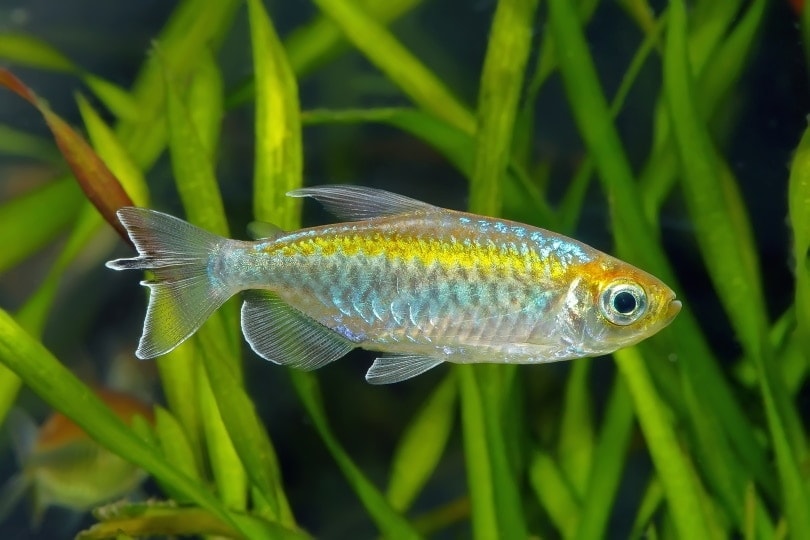
Why Do Fish Need To Smell?
A fish’s sense of smell allows them to navigate their environment, and it is crucial for some fish’s survival. While we are used to seeing pet fish in a clear tank, it’s worth noting that fish in the wild may live in murky waters and therefore, rely extensively on their sense of smell to go about their daily activities.
- Locate food: The amino acids from the food leach into the water and can be detected by the fish. Bile acids from other fish’s waste can help fish find areas that other fish have used to eat.
- Avoid predators: Fish need to smell if they want to avoid or detect predators near them.
- Identify other fish: Fish can identify other fish by smelling for pheromones and other chemical stimulants secreted by fish for schooling or reproductive purposes.
- Find potential mates: Pheromones released by potential mates lets other fish know when reproduction can take place.
- Detecting spawning ground: Any odors that were released by the fish in a spawning ground allow the fish to follow the smell back to it when necessary.
- Migration: Certain fish can smell the chemical composition of the water to migrate from one body of water to the other.
- Finding their habitat: The pheromones and familiar smells can help fish locate their “homes”.
- Detecting pheromones: Fish can detect pheromones released by fish to trigger a behavioral response in other fish.
Can Fish Smell Out of Water?
Fish can only smell in an aquatic environment (underwater), so any of the odorants that they smell need to be soluble in water and are not found in the air. If a fish was to be taken out of the water, they would not be able to smell anything since their olfactory system cannot work. This is comparable to a human who cannot smell underwater, since you would need to inhale to smell something.
Conclusion
Now that you have discovered that fish can smell in the water, it will be interesting to observe how fish behave in an aquarium. You can test your fish’s sense of smell by dropping pieces of their fish food in different places in the aquarium and watching how they smell and taste around the food. Most fish have a good sense of smell, while some fish rely on their other senses such as taste.
Featured Image Credit: Sergei Mugashev, Shutterstock





